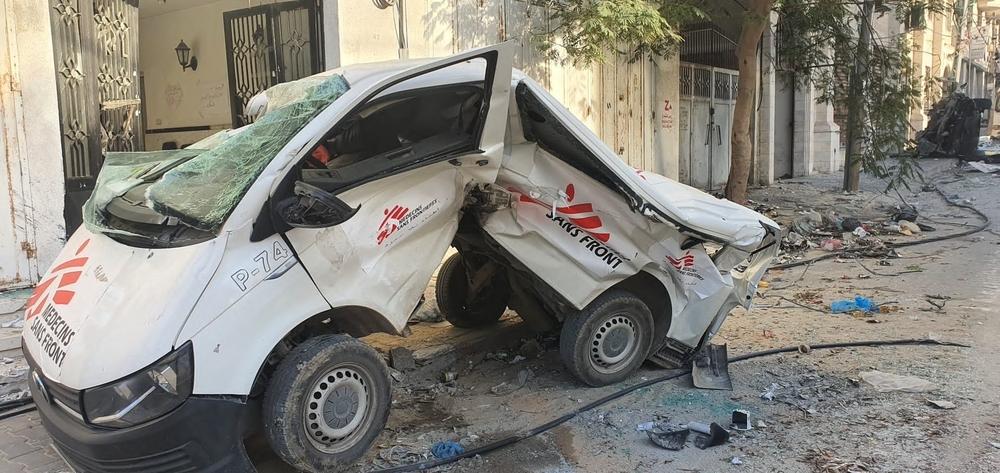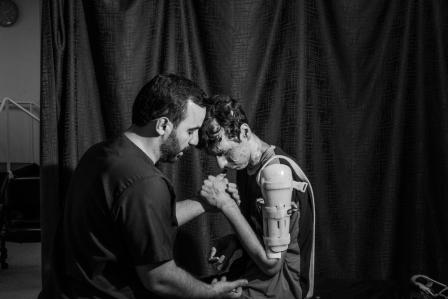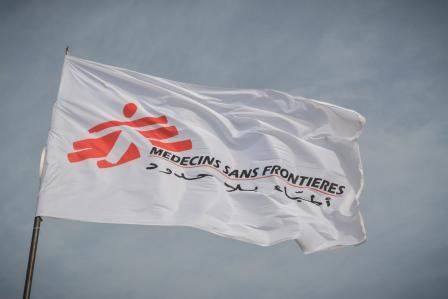จากองค์การแพทย์ไร้พรมแดนถึงคณะมนตรีความมั่นคงแห่งสหประชาชาติ: พลเมืองในกาซาต้องการการหยุดยิงทันทีและถาวร

ในวันที่ 20 พฤศจิกายน รถยนต์ขององค์การฯ 5 คันที่จอดอยู่หน้าคลินิกขององค์การฯ ถูกทำลายระหว่างปฏิบัติการทางการทหารของกองทัพอิสราเอล - ดินแดนปาเลสไตน์ 24 พฤศจิกายน 2566 © MSF
นครนิวยอร์ก 22 กุมภาพันธ์ 2567 – คริสโตเฟอร์ ล็อกเยียร์ (Christopher Lockyear) เลขาธิการองค์การแพทย์ไร้พรมแดน (Doctors Without Borders/Médecins Sans Frontières - MSF) องค์การมนุษยธรรมระหว่างประเทศทางการแพทย์เรียกร้องให้มีการออกคำสั่งหยุดยิงโดยทันทีและถาวรในพื้นที่กาซา ในการประชุมประจำเดือนเพื่อติดตามสถานการณ์พื้นที่กาซาของคณะมนตรีความมั่นคงแห่งสหประชาชาติ (United Nations Security Council - UNSC) ล็อกเยียร์ยังได้เรียกร้องให้มีการคุ้มครองสถานพยาบาล เจ้าหน้าที่ทางการแพทย์ และผู้ป่วยอย่างเป็นรูปธรรม
“มีการเรียกประชุมครั้งแล้วครั้งเล่า มีความพยายามในการออกมติครั้งแล้วครั้งเล่า หากคณะมนตรีความมั่นคงแห่งสหประชาชาติยังคงล้มเหลวในการแก้ไขความขัดแย้ง (ในกาซา) อย่างมีประสิทธิภาพ” ล็อกเยียร์กล่าว “องค์การฯ ตามติดความจงใจซื้อเวลาของสมาชิกของคณะมนตรีความมั่นคงในขณะที่พลเมืองกาซายังคงเสียชีวิตอย่างต่อเนื่อง ความตาย ความสูญเสีย และการบังคับให้พลัดถิ่นเหล่านี้คือผลงานทางการเมืองและการทหารที่สะท้อนการมองข้ามชีวิตของพลเมืองอย่างชัดเจน หากการตัดสินในครั้งนี้ (ออกข้อมติครั้งใหม่) สามารถสร้างผลลัพธ์ที่แตกต่างออกไปได้”
สงครามที่ดำเนินต่อมายาวนานกว่า 4 เดือน ปรากฏตัวเลขชาวปาเลสไตน์เสียชีวิตจากการโจมตีด้วยระเบิดและอาวุธจากกองทัพอิสราเอลเกือบ 30,000 ราย มีการประเมินว่าพลเมืองร้อยละ 75 หรือราว 1.7 ล้านราย ถูกบังคับให้พลัดถิ่น มีผู้ได้รับบาดเจ็บและติดเชื้อจากการอาศัยอยู่ในพื้นที่ที่ไม่ปลอดภัย ไม่ถูกสุขอนามัย และสภาพแวดล้อมที่เลวร้าย การให้บริการทางการแพทย์เป็นเรื่องที่แทบเป็นไปไม่ได้ในกาซา สืบเนื่องมาจากข้อเท็จจริงว่าสถานพยาบาลที่ควรได้รับการยกเว้นและปลอดภัยจากการโจมตี ก็ตกเป็นเป้าหมายของกองทัพเช่นกัน
“ผู้ป่วยขององค์การฯ ได้รับบาดเจ็บสาหัส ต้องตัดอวัยวะ แขนขาหัก รวมถึงแผลไหม้อย่างรุนแรง” ล็อกเยียร์บรรยายต่อ “พวกเขาต้องการการดูแลอย่างใกล้ชิด ต้องการการฟื้นฟูร่างกายที่เข้มข้นและต่อเนื่อง เจ้าหน้าที่ทางการแพทย์ไม่สามารถให้การดูแลผู้ป่วยเหล่านี้ในสนามรบหรือกลางโรงพยาบาลที่ถูกทำลายเป็นเถ้าถ่าน ศัลยแพทย์ไม่มีผ้าพันแผลที่ใช้สำหรับหยุดเลือดของผู้ป่วย สิ่งที่พวกเขากำลังทำอยู่คือการใช้ผ้าพันแผลหนึ่งครั้ง บีบเอาเลือดที่เปื้อนผ้าออก ซักล้าง และนำผ้าเข้าระบบฆ่าเชื้อ เตรียมพร้อมสำหรับใช้กับผู้ป่วยรายถัดไป”
ในวันที่ 20 กุมภาพันธ์ ระหว่างที่ตัวแทนจากประเทศสหรัฐอเมริกาวีโต้ข้อมติหยุดยิงของคณะมนตรีความมั่นคงแห่งสหประชาชาติ กองทัพอิสราเอลมีการดำเนินการทางการทหารด้วยการใช้รถถังโจมตีอาคารที่ปรากฏสัญลักษณ์องค์การฯ ชัดเจน ในเขตอัล มาวาซี (Al-Mawasi) เมืองข่าน ยูนิส (Khan Younis) ส่งผลให้เจ้าหน้าที่ขององค์การฯ ได้สูญเสียภรรยาและลูกสาวตามกฎหมายของเขา รวมถึงยังมีผู้ได้รับบาดเจ็บอีก 6 ราย ในช่วงสัปดาห์ที่ผ่านมา กองทัพอิสราเอลออกคำสั่งอพยพและจู่โจมเข้าไปในสถานพยาบาลขนาดใหญ่ที่สุดทางตอนใต้ของกาซาอย่างโรงพยาบาลนาสเซอร์ (Nasser) พวกเขาถูกบังคับให้ออกจากพื้นที่โดยไร้จุดหมาย พวกเขาไม่สามารถเดินทางกลับไปยังพื้นที่ทางตอนเหนือของกาซาที่ถูกทำลายเป็นวงกว้างได้แล้ว และพวกเขาเองก็ไม่สามารถอาศัยอย่างปลอดภัยในเมืองราฟาห์ (Rafah) ทางตอนใต้ได้อีกต่อไป เพราะกองทัพอิสราเอลยังคงโจมตีทางอากาศและมีการประกาศแผนการยกระดับปฏิบัติการทางการทหารภาคพื้นดิน
นับตั้งแต่สงครามในกาซาปะทุขึ้น หน่วยงานทางการแพทย์ขององค์การฯ และผู้ป่วยในสถานพยาบาลภายในพื้นที่กาซา 9 แห่งถูกบีบให้อพยพ มีเจ้าหน้าที่ขององค์การฯ 5 รายถูกสังหาร การให้บริการทางการแพทย์และการเพิ่มขีดจำกัดในการทำงานเพื่อช่วยชีวิตผู้คนเป็นเรื่องที่ยากเกินกว่าจะทำให้เกิดขึ้นจริง เพราะการโจมตีด้วยระเบิด การใช้กระสุน และการต่อสู้อย่างรุนแรง
คลื่นสะท้อนจากการละเว้นการใช้กฎหมายมนุษยธรรมระหว่างประเทศจะแผ่ขยายออกไปนอกพื้นที่กาซา มันจะส่งผลต่อความนึกคิดมโนธรรมร่วม (collective conscience) ของพวกเรา มันจะไม่ใช่การละเว้นทางการเมือง แต่มันคือการละทิ้งทางการเมืองคริสโตเฟอร์ ล็อกเยียร์ เลขาธิการองค์การฯ
Read the full address
Doctors Without Borders / Médecins Sans Frontières (MSF) Briefing to the UN Security Council on 22 February 2024.
Madam President, excellencies, colleagues,
As I speak, more than 1.5 million people are trapped in Rafah. People violently forced to this strip of land in southern Gaza are bearing the brunt of Israel’s military campaign.
We live in fear of a ground invasion.
Our fears are rooted in experience. Just 48 hours ago, as a family sat around their kitchen table in a house sheltering MSF staff and their families in Khan Younis, a 120mm tank shell exploded through the walls, igniting a fire, and killing two people and severely burning six others. Five of the six injured are women and children.
We took every precaution to protect the 64 humanitarian staff and family members from such an attack by notifying warring parties of the location and clearly marking the building with an MSF flag.
Despite our precautions, our building was struck not only by a tank shell but by intense gunfire. Some were trapped in the burning building while active shooting delayed ambulances from reaching them. This morning, I am looking at photos that show the catastrophic extent of the damage and I am watching videos of rescue teams removing the charred bodies from the rubble.
This is all too familiar—Israeli forces have attacked our convoys, detained our staff, and bulldozed our vehicles, and hospitals have been bombed and raided. Now, for a second time, one of our staff shelters has been hit. This pattern of attacks is either intentional or indicative of reckless incompetence.
Our colleagues in Gaza are fearful that, as I speak to you today, they will be punished tomorrow.
Madame President, every day we witness unimaginable horror.
We, like so many, were horrified by Hamas’ massacre in Israel on October 7th, and we are horrified by Israel’s response. We feel the anguish of families whose loved ones were taken hostage on October 7th. We feel the anguish of the families of those arbitrarily detained from Gaza and the West Bank.
As humanitarians, we are appalled by violence against civilians.
This death, destruction, and forced displacement are the result of military and political choices that blatantly disregard civilian lives.
These choices could have been—and still can be—made very differently.
For 138 days, we witnessed the unimaginable suffering of the people of Gaza.
For 138 days, we have done everything we can to enact a meaningful humanitarian response.
For 138 days, we have watched the systematic obliteration of a health system we have supported for decades. We have watched our patients and colleagues be killed and maimed.
This situation is the culmination of a war Israel is waging on the entire population of the Gaza strip—
a war of collective punishment,
a war without rules,
a war at all costs.
The laws and the principles we collectively depend on to enable humanitarian assistance are now eroded to the point of becoming meaningless.
Madam President, the humanitarian response in Gaza today is an illusion—a convenient illusion that perpetuates a narrative that this war is being waged in line with international laws.
Calls for more humanitarian assistance have echoed across this Chamber.
Yet in Gaza we have less and less each day—less space, less medicine, less food, less water, less safety.
We no longer speak of a humanitarian scale-up; we speak of how to survive even without the bare minimum.
Today in Gaza, efforts to provide assistance are haphazard, opportunistic, and entirely inadequate.
How can we deliver life-saving aid in an environment where the distinction between civilians and combatants is disregarded?
How can we sustain any type of response when medical workers are being targeted, attacked, and vilified for assisting the wounded?
Madam President, attacks on health care are attacks on humanity.
There is no health system to speak of left in Gaza. Israel’s military has dismantled hospital after hospital. What remains is so little in the face of such carnage. It is preposterous.
The excuse given is that medical facilities have been used for military purposes, yet we have seen zero independently verified evidence of this.
In exceptional circumstances where a hospital loses its protected status, any attack must follow the principles of proportionality and precaution.
Instead of adherence to international law, we see the systematic disabling of hospitals. This has left the entire medical system inoperable.
Since October 7th, we have been forced to evacuate nine different health facilities.
One week ago, Nasser Hospital was raided. Medical staff were forced to leave despite repeated assurances that they could stay and continue caring for patients.
These indiscriminate attacks, as well as the types of weapons and munitions used in densely populated areas, have killed tens of thousands and maimed thousands more.
Our patients have catastrophic injuries, amputations, crushed limbs, and severe burns. They need sophisticated care. They need long and intensive rehabilitation.
Medics cannot treat these injuries on a battlefield or in the ashes of destroyed hospitals.
There are not enough hospital beds, not enough medications, and not enough supplies.
Surgeons have had no choice but to carry out amputations without anesthesia, on children.
Our surgeons are running out of basic gauze to stop their patients from bleeding out. They use it once, squeeze out the blood, wash it, sterilize it, and reuse it for the next patient.
The humanitarian crisis in Gaza has left pregnant women without medical care for months. Women in labor cannot reach functional delivery rooms. They are giving birth in plastic tents and public buildings.
Medical teams have added a new acronym to their vocabulary: WCNSF— wounded child, no surviving family.
Children who survive this war will not only bear the visible wounds of traumatic injuries but the invisible ones, too—those of repeated displacement, constant fear, and witnessing family members literally dismembered before their eyes. These psychological injuries have led children as young as five to tell us they would prefer to die.
The dangers for medical staff are enormous. On a daily basis, we are making the choice to continue working, despite the increasing risks.
We are scared. Our teams are beyond exhausted.
Madam President, this must stop.
We, along with the world, are closely watching how this Council and its members have approached the conflict in Gaza.
Meeting after meeting, resolution after resolution, this body has failed to effectively address this conflict. We have watched members of this Council deliberate and delay while civilians die.
We are appalled by the willingness of the United States to use its powers as a permanent Council member to obstruct efforts to adopt the most evident of resolutions: one demanding an immediate and sustained ceasefire.
Three times this Council has had an opportunity to vote for the ceasefire that is so desperately needed and three times the United States has used its veto power, most recently this Tuesday.
A new draft resolution by the United States ostensibly calls for a ceasefire. However, this is misleading at best.
This Council should reject any resolution that further hampers humanitarian efforts on the ground and leads this Council to tacitly endorse the continued violence and mass atrocities in Gaza.
The people of Gaza need a ceasefire not when “practicable,” but now. They need a sustained ceasefire, not a “temporary period of calm.” Anything short of this is gross negligence.
The protection of civilians in Gaza cannot be contingent on resolutions from this Council which instrumentalize humanitarianism to blur political objectives.
The protection of civilians, of civilian infrastructure, of health workers and health facilities, falls first and foremost on the parties to the conflict.
But it is also a collective responsibility—a responsibility which rests with this Council and its individual members, as parties to the Geneva Conventions.
The consequences of casting international humanitarian law to the wind will reverberate well beyond Gaza.
It will be an enduring burden on our collective conscience.
This is not just political inaction—it has become political complicity.
Two days ago, MSF staff and families were attacked and died in a place they were told would be protected.
Today our staff are back at work, risking their lives once again for their patients.
What are you willing to risk?
We demand the protections promised under International Humanitarian Law.
We demand a ceasefire from both parties.
We demand the space to turn the illusion of aid into meaningful assistance.
What will you do to make this possible?
Thank you, Madam President.
สนับสนุนการทำงานในสถานการณ์ฉุกเฉินของพวกเรา
สนับสนุนพวกเราในการส่งต่อเวชภัณฑ์ที่จำเป็นต่อการช่วยชีวิตผู้ป่วยในสถานการณ์ฉุกเฉิน ด้วยการบริจาคตอนนี้







